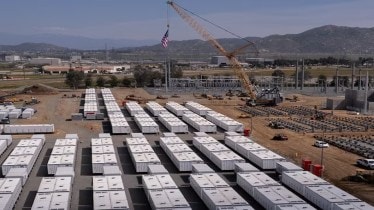India’s battery energy storage systems (BESS) ecosystem is expected to witness major major growth prospects, with the funding opportunity expected to be at Rs 3.5 lakh crore by FY32. The medium term investment provided by upcoming cell manufacturing capital expenditure is likely to around Rs. 80,000 crore, according to a new report by investment banking firm SBI Caps.
Companies such as JSW Energy, Reliance Industries and Tata Power have emerged as top players in the BESS space in the recent years.
“Clearly, the funding opportunity is vast in this segment, both at project level and for the upstream ecosystem. The critical variables which lenders may consider while funding BESS projects include the presence of a firm’s power purchase agreement (PPA) / power sale agreement (PSA) from a credible discom (and its shortfall in energy storage obligation (ESO) /renewable purchase obligation (RPO) target), project model (co-location/standalone), and cell technology in use,” the report stated.
Battery manufacturing will be another source of heavy capital expenditures as both traditional and new players muscle it out to gain scale. Given the technological innovations rife in this sector, merger and acquisition opportunities also reign supreme, SBI Caps said.
Major players have announced cell capacities of nearly 120 GWh, which will barely be enough to meet projected demand in the next 2-3 years – thus, more could be on the way, the firm said. “A cascading effect is also expected in the cell components ecosystem, with major players in cathodes, anodes, electrolytes, and separators, all having announced copious capital expenditures. Thus, the sector is set for a boom across the value chain – from BESS projects, to cell manufacturing, down to components of cells,” it said.
This would be aided by helpful government directives on waiver of ISTS transmission charges and ESO/RPO trajectory creating a steep trajectory for discoms to adhere to, the latter boosting demand.
Batteries and associated components make up ~80% of the cost of a BESS. Currently, battery cells and their upstream ecosystem are highly concentrated in China, making India vulnerable to imports in times of geopolitical complexity.
The country is poised to significantly augment its energy storage capacity, with a projected 12-fold increase to ~60 GW by FY32, outpacing the already impressive growth pencilled in for renewable energy (RE) sources. The evolving landscape of RE tenders reflects this trend with a substantial uptick in the proportion of projects incorporating storage solutions from 5% in FY20 to 23% in FY24, the report mentioned.
BESS and pumped storage project (PSPs) methods are both emerging as solution to primary energy storage problem, with both expected to capture nearly 100% of the pie. However, BESS will be the dominant technology, aided by its locational flexibility, promise of technological improvements dipping tariffs further, improving discharge characteristics, and rapid response time, it said.
While BESS will see an astronomical surge of 375 times to 42 GW, PSP also won’t be far behind, growing fourfold to 19 GW by FY32, from FY24 levels, it said.
Considering the expansion prospects, the government has announced a PLI for Advanced Cell Chemistry (ACC), which envisages the set-up of 55 GWh of capacities, with a special carve out of 5 GWh for technologically advanced systems, it said.
